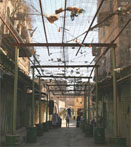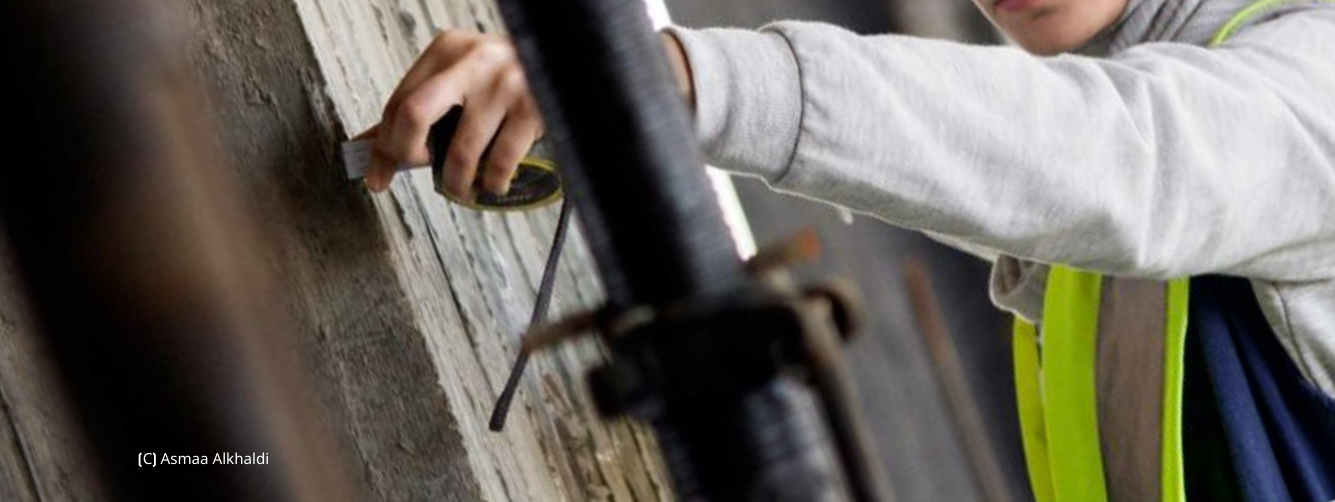
Hana' Abu Haikal: "MIFTAH has armed me with enough knowledge to continue on this path"
Hana' Jameel Rateb Abu Haikal from Hebron's Tul Rumeida quarter lives among the infamous Hebron settlers, who in 1984, set up a hostile settler enclave adjacent to her home. Since then, Abu Haikal and her family have suffered at the hands of these provocative settlers, their attacks and their suffocating siege.
Hana' works as a beautician. She owns a small beauty salon in the Wadi Tuffah neighborhood in Hebron. She is also a founding member of the beauticians union, both in Hebron and at the regional Arab level. She was a judge in competitions in the Arab world and in 2005, she represented Palestine in more than one country.
It looks as if you are a very strong and ambitious woman who has fought for her right to stay in her home and on her land to raise her children. You must be well known for your struggles and for your role in public life in this community.
Abu Haikal: I am not exaggerating when I tell you the situation here is unbearable. Only yesterday, the settlers burned my fourth car. I have not seen any kind of support or solidarity from our officials except for empty words. This is really frustrating and depressing. Not to mention that my daughter's wedding is next week. I now have to look for a house outside our area so that she can leave from it as a bride because it is virtually impossible for any vehicle to drive up to my house. We don't want to take that risk on that day because you never know what to expect from such extremist settlers. I swear, yesterday as I was writing up the invitations, I began to cry.
As for Abu Haikal's relationship with MIFTAH through its "Combating Violence against Palestinian Women through the Empowerment of Community-Based Organizations" funded by the Austrian Development Agency, she says: "My introduction to MIFTAH began in 1999 when they contacted me through my work and invited me to a media workshop given by journalist Shireen Abu Aqla. I always believed that the media is a weapon and is our only outlet in confronting this Israeli cancer. I would try to expose the settlers' practices through the media. Lately, I got reacquainted with MIFTAH through its coordinator in Hebron Maysoon Qawasmi. She helped me to connect with media institutions and outlets. I was then invited to participate in an entire workshop on combating violence against women, which had a great impact on me and on my ability to communicate with the community, which was very important. We are really in need of such courses.
In spite of the harsh circumstances under which she has lived and the many hardships that have come her way, Hana Abu Haikal says she insists on continuing her work and her struggle, partly through participating in MIFTAH's "Combating Violence against Palestinian Women through the Empowerment of Community-Based Organizations", which she says has left a noticeable impact on her life and personal growth. "Participating in this project has positively impacted on my life in terms of boosting my confidence in particular. Security Council resolution 1325 is an extremely important resolution and more should be done to make it better understood," she says. Abu Haikal added that most women know nothing about this resolution and that the training gave the participant women a crash course in 1325 and its significance. "Especially since women in our society are oppressed and the laws are very unfair towards us. I am speaking from personal experience. But still, I try not to let this get in the way of taking care of my family as much as possible. Many mothers raise their children alone after getting custody of the children and the father, who in many cases has abandoned the family, does not care one bit. But then, when there are any major decisions about the lives of the children, especially the girls, the father becomes the only person authorized to make decisions for her. The mother, the one who spent years raising these children, studying with them, nursing them to health, she has no say at all. Why doesn't the mother, with the custody, have the final say in decisions about her family's lives? The children are negatively affected by this as well. That is why I always suggest a change in such status laws, which are unfair and humiliating for women. I hope MIFTAH takes my suggestion to heart because the secret to MIFTAH's success is the way it always seeks out the important issues in society, sheds light on them and disseminates them at the national level."
Abu Haikal also credits MIFTAH's activities with impacting her family life. "MIFTAH's activities and training courses have had a tremendous impact on my home life and on my personal situation in particular. We are moving in the right direction but I think we still have a ways to go in terms of raising awareness about this subject so that everyone could benefit from it. The underlying goal of such training courses is to boost self-confidence and reinforce sound principles. I felt a huge difference between my situation before and after taking these courses."
Abu Haikal continues that her communication with MIFTAH has only strengthened her determination to stay in her home and has opened new doors of communication for her with other civil society institutions. "I suggested that we work on raising the awareness of women at the neighborhood level so they would have enough knowledge and awareness about the issues at hand, just like we have done at the institutional level."
"I am appreciative of all those who helped us at the financial, moral and consultative levels so that our families can stay steadfast in their homes," she says, adding that this team spirit and support is missing at the government level. "Our leadership should be the strongest pillar of support for us. It is the one that should bear the responsibility towards supporting our steadfastness and our struggle to remain in our homes. We cannot burden those few supporters with their modest efforts with the responsibility of confronting the settlers."
As for any future participation with MIFTAH, Abu Haikal says they can count her in. "I trust MIFTAH and those who run it. We are an oppressed people so when an organization gives me this kind of confidence and arms me with awareness and knowledge about things going on around me, I jump at the opportunity to participate in its activities. I think the awareness raising that MIFTAH does should not be underestimated. Such awareness plays a huge role in supporting women in general, not just in my case personally.
Abu Haikal suggests the formation of a lobby that would move to cancel laws that weaken women's stances and suppress their rights while proposing new alternative laws for legislation. "I suggest that MIFTAH works on two planes: one towards disseminating this project among a larger group of people to create a popular base for it and a second to pressure legislators to make the changes needed. This could be done in various ways such as petitions. I would also like to suggest that a "soldier's salary" be allocated to every Palestinian family living adjacent to a settlement in order to support these families and strengthen their resolve to stay. This would be like social security for them, especially if the breadwinner of the family is unemployed. In facing extremist settlers, these citizens need to feel that they are not alone."






